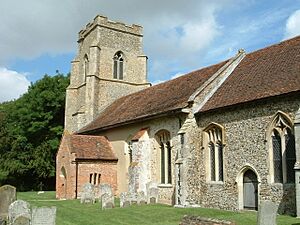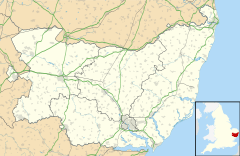Kettlebaston facts for kids
Quick facts for kids Kettlebaston |
|
|---|---|
 Church of St Mary the Virgin, Kettlebaston |
|
| OS grid reference | TL965502 |
| District |
|
| Shire county | |
| Region | |
| Country | England |
| Sovereign state | United Kingdom |
| Post town | IPSWICH |
| Postcode district | IP7 |
| EU Parliament | East of England |
Kettlebaston is a small village in Suffolk, England. It is home to just over 30 people. The village is located about 3 miles (5 km) east of Lavenham. Its name comes from an old Norse name, "Kitelbjorn's farmstead." Kettlebaston was first mentioned in the famous Domesday Book in 1086.
Contents
History of Kettlebaston
A Village's Journey Through Time
Kettlebaston was once a rich area. This was because of the mediaeval (Middle Ages) wool trade. When the wool trade slowed down, people in Kettlebaston could not afford to update their homes. This actually helped keep the village's old look! Many timber-framed houses stayed the same.
Over time, the number of houses and people went down. From over 200 people, the village almost disappeared. By the 1960s, Kettlebaston was in a bad state. The road was just a dirt track. There was no electricity or running water. Even today, it has no gas or main drains. In 1949, many houses were falling apart.
Rebirth of the Village
Farm workers left the land as machines took over their jobs. Then, "outsiders" discovered the quiet beauty of Suffolk. This started a new era for Kettlebaston. The small cottages where many families once lived were fixed up. The village came back to life. In 1989, Kettlebaston won "Babergh Best Kept Village." It was also runner-up in the "Suffolk Community Council Best Kept Village Competition."
The Village Sign and Royal Connections
The village sign has two crossed sceptres with doves on top. It was put up to celebrate the coronation of King George VI and Queen Elizabeth. The sign also remembers a special honor from 1445. King Henry VI gave the land of Kettlebaston to William de la Pole, 1st Marquess of Suffolk. In return, William had to carry a golden sceptre at all future English King's coronations. He also carried an ivory sceptre for Queen Margaret of Anjou and future Queens. This special job ended when Henry VIII took back the land.
St Mary the Virgin Parish Church
The church of St Mary the Virgin has very old Norman parts. It has a font from around the year 1200. The building is listed as Grade I, which means it is very important. The church was "built anew" in 1342. It stayed mostly the same until the 1540s. At that time, Protestant iconoclasts (people who destroyed religious images) damaged it.
Today, the church has one of Suffolk's best post-Reformation rood screens. This screen was designed by Father Ernest Geldart. It was decorated by Patrick Osborne and Enid Chadwick. The church also has a rare Sacred Heart altar on a Stuart Holy Table. The small lead spire that once topped the tower is now gone.
| Bell Number | Weight | Year Made | Founder |
|---|---|---|---|
| Treble | 5cwt | 1636 | John Darbie of Ipswich |
| Two | 6cwt | 1699 | Henry Pleasant of Sudbury |
| Tenor | 9wt 2qr | 1567 | Stephen Tonni II of Bury St Edmunds |
Many followers of the Anglo-Catholic movement visit Kettlebaston. From 1930 to 1964, Reverend Father Harold Clear Butler led the church. He held Roman Mass every day. He also celebrated High Mass and Benediction on Sundays. He even removed state notices from the porch. He also refused to keep registers or recognize the local Archdeacon of Sudbury. Despite some challenges, the church finally got electric heating and lighting in 2014.
Kettlebaston Today
The village of Kettlebaston today has no shop, school, or pub.
Notable Residents
- Patrick Murdoch (died 1774); he was an author, publisher, and mathematician.
Images for kids
 | Percy Lavon Julian |
 | Katherine Johnson |
 | George Washington Carver |
 | Annie Easley |



